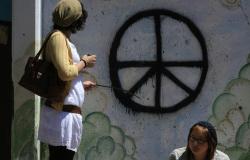The Secret to Ending War? It's Too Easy: More Women in Peace Negotiations

We’re all aware of the gender imbalance in boardrooms, Hollywood studios and politics. But what about global peace talks? Only 4% of signatories to peace agreements between 1992 and 2011 were women, and only 9% of negotiators. And yet, studies have shown that female participation is the secret to ensuring lasting peace.
Ending a war is a complex and risky process, and the stakes are high. Recent examples of failure include the breakdown of the South-Sudanese peace talksheld in Ethiopia. The involvement of women in the formal negotiations was minimal, as it often is. In recent conflicts ranging from Syria to Yemen and north-east Nigeria, women have been mostly portrayed as victims. Such stereotyping excludes them from taking a meaningful seat at the negotiating table, especially since formal talks tend to focus on bringing the warring parties together. Less than 10% of peace negotiators are women.
This is all the more problematic since women can significantly boost the chances of a peace deal. According to UN Women, when women participate in a peace process it increases the likelihood of peace lasting more than two years by 20%. The UN Security Council has called for women to be more involved in conflict resolution.
Of course, women in war zones do suffer horrendous sexual and physical violence. But they are not only victims. They are peacemakers, perpetrators, mediators and economic stakeholders, sometimes simultaneously. Historically, women have often been on the front line, pushing for change.

In Northern Ireland, Betty Williams and Mairead Maguire co-founded the Community for Peace People and mobilized over 10,000 Catholic and Protestant women to march and advocate for peace. They received the 1976 Nobel Peace Prize for their efforts to bring about an end to hostilities.
In Liberia, Leymah Gbowee united Christian and Muslim women in an interfaith movement, the Women of Liberia Mass Action for Peace. The women acted as intermediaries between Charles Taylor and rebel leaders, staged sit-ins to keep the negotiators from leaving the presidential palace, and even carried out sex strikes in a bid to stop the men from fighting. Their efforts contributed to the exile of Charles Taylor and played a role in bringing peace to their country. It also lay the foundations for the ascent of Ellen Johnson Sirleaf, the first female African head of state. In 2011, both Gbowee and Johnson Sirleaf were awarded the Nobel Peace Prize.
More recently, in 2014, Miriam Coronel-Ferrer led the Filipino government’s negotiating team. She was the first woman to sign a major peace deal: the Comprehensive Agreement on the Bangsamoro. The treaty provided a framework for ending the 40-year conflict between the Filipino government and the Moro Islamic Liberation Front (MILF) a rebel group that hoped to create an independent Muslim majority state. Women made up 33% of that negotiating team and 25% of the signatories. Together with local civil society organizations, they ensured that the deal included policies for greater opportunities for women. The accord was not immediately implemented, but in 2017 efforts were made to incorporate its stipulations into national law.
In Colombia, a peace treaty was signed in 2016 to bring an end to the 50-year conflict between the government and the Revolutionary Armed Forces (FARC). The conflict had claimed over 200,000 lives and led to the displacement of about 7 million people. Women made up 20% of the government team and 43% of the FARC negotiating team. It was the first time a gender sub-commission had been included in a peace negotiation. The meaningful participation of women at all levels, from negotiators to local activists, had a hugely positive impact. The final treaty included a range of provisions for women, including the promotion of women's socio-political and economic rights, and measures against gender-based violence.
Unfortunately, these examples are still the exception rather than the rule. In a myriad of ongoing conflicts, women’s potential as peacemakers is ignored. In Nigeria, for example, women have been excluded from discussions over the recent farmer-herder crisis. In Yemen and South Sudan, women are yet to be meaningfully included in the formal processes.
Women can change society. They can help end war, and bring about lasting peace. It’s time they get the chance to do so.
Chizitera Njoku , Programme Support Officer, PeaceNexus Foundation.
This post first appeared on the Agenda blog.
Image credit: Michael Meyer via Flickr (CC BY 2.0)


